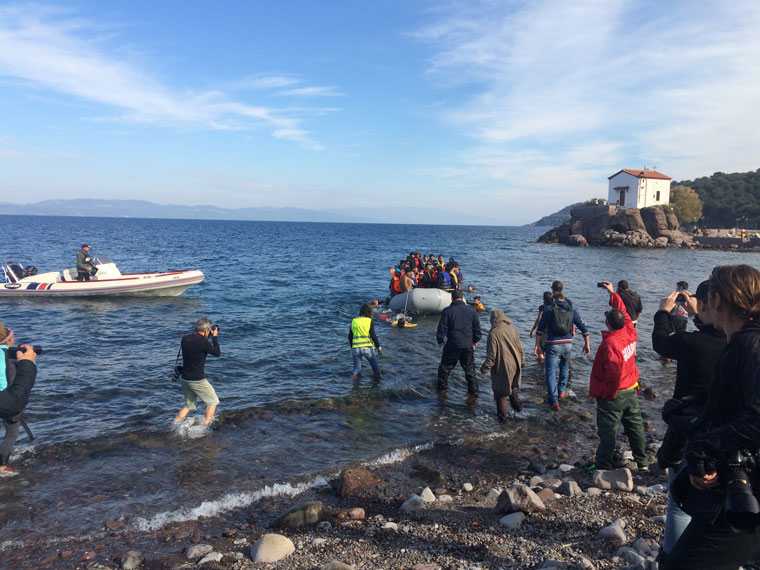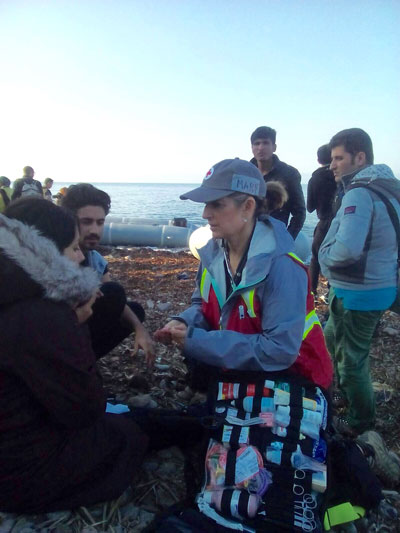
Idyllwild resident Mary Lehman has a history of aiding others. Whether as an emergency medical technician at fire camp, a lookout for the U.S. Forest Service or on ski patrol, showing up to help others who are injured or in distress is not new to her. So it was not surprising, after having discussed it with her husband, that Lehman decided to go to the Greek island of Lesbos, just south of the Turkish coast, to assist refugees arriving from Syria and Iraq. “I knew about the drama and flood of refugees arriving there in the beginning of November,” she recalled. “I booked my ticket Nov. 1 or 2 and departed on Nov. 10. I’m a problem-solving person. When I saw the need and realized I could go, I knew I had to go.”
A distinguished lawyer, admitted to practice before the U.S. Supreme Court, federal Appeals Courts (third, fourth, fifth, ninth and 10th districts), U.S. District Court (Southern District of California), the California Supreme Court and all California State Courts, Lehman navigates landscapes and waters that can pose major challenges to most others.
She also is a retired professional women’s boxer, having left the profession ranked number nine in the world in super bantam weight division. She is a graduate of St. John’s University in Santa Fe, New Mexico, and a cum laude graduate of the University of San Diego law school. “I have the confidence to find my way forward,” she said of her surprising array of skill sets.
Before going, Lehman bought $800 in medical equipment and supplies, gave herself a crash course in Greek (she also speaks Italian, German, French and Swahili), and set out to join what turned out to be an entirely volunteer operation — one not directed by any governmental or non-governmental organization.
“At first, when refugees began arriving, it was just the local island people helping them — local fishermen helping to tow disabled boats to shore, islanders getting them blankets off their own beds and finding dry clothes for them,” she said. “Thousands of refugees were arriving daily and locals were overwhelmed. Then, from all over the world, people just started showing up to help. It was really amazing that it just happened. Organization came out of non-organization. People learned to work together, to work the problems. The intentions of all were good and we got better organized as it went along.”

Photo courtesy of Mary Lehman
Lehman spoke about the misconception that refugees were all young, able-bodied men. “For the most part, those arriving were young families and old people,” she said. “And their stories were heartbreaking. A young woman in her 20s, with a husband and young child, had had a kidney removed just 10 days before making the crossing. She had sold the kidney to finance the trip. My first day, a young man arrived with welts all over his back where he had been beaten. On another island, a 109-year-old woman arrived in a wheelchair. Islanders wanted to put her in a hotel, but she refused, saying she wanted to stay with those with whom she had come.”
Lehman noted smugglers charged on average $1,500 per person to make the 5-mile crossing from the Turkish coast to the Greek island of Lesbos. “The boats were rickety plywood boats or inflatables, made for 25. Usually there were 65 or more in each boat. Often, motors gave out because of malfunction or insufficient gas for the crossing.” Lehman noted that smugglers gave discounts for more dangerous night crossings. “You just had to be there and aware 24/7, hearing people offshore and yelling in the night. At any moment boats could capsize. These people were so grateful for the aid we were giving. They had so little but they insisted on giving us gifts for the help we provided.
“For me, the most difficult moment was when someone screamed medic and thrust a 3- or 4-year-old unconscious boy into my arms. We were able to revive him.”
Lehman recalled stories refugees told of how families had pooled money to send young families or unaccompanied minors, to give them a better life, while other family members had to remain behind. “Pregnant women were terrified their babies had died in the womb during the crossing. A holistic practitioner from Switzerland felt their stomachs and listened for movement to reassure them their babies were still alive.
“People were kissing the ground when they arrived, unaware that other European Union country borders were closing and that further difficult travel to final sanctuaries in other parts of Europe was still necessary.”
Lehman said coming back to the U.S., after having been in Lesbos for two weeks, was very difficult. “While there I had just been working the problem, accessing medical conditions and responding. But in coming back, I kept thinking I could have stayed longer and made more of a difference. I kept dreaming of looking for my headlamp to rush to assist arrivals, of being shot by a smuggler. I’m sure it’s some level of post-traumatic stress.”
Lehman still marvels at how so many came from so many disparate countries and cultures to assist the arriving refugees. “Everyone came because they were compelled to do so,” she said. “There was this huge bonding of doctors, medics and everyday volunteers, each doing whatever they could to help. Sometimes it was rescue from the boats, sometimes trauma therapy and medical treatment, and sometimes arriving refugees just needed someone to hold their hands.”
For more on the Lesbos refugee situation, Google “Lesbos refugees.”










